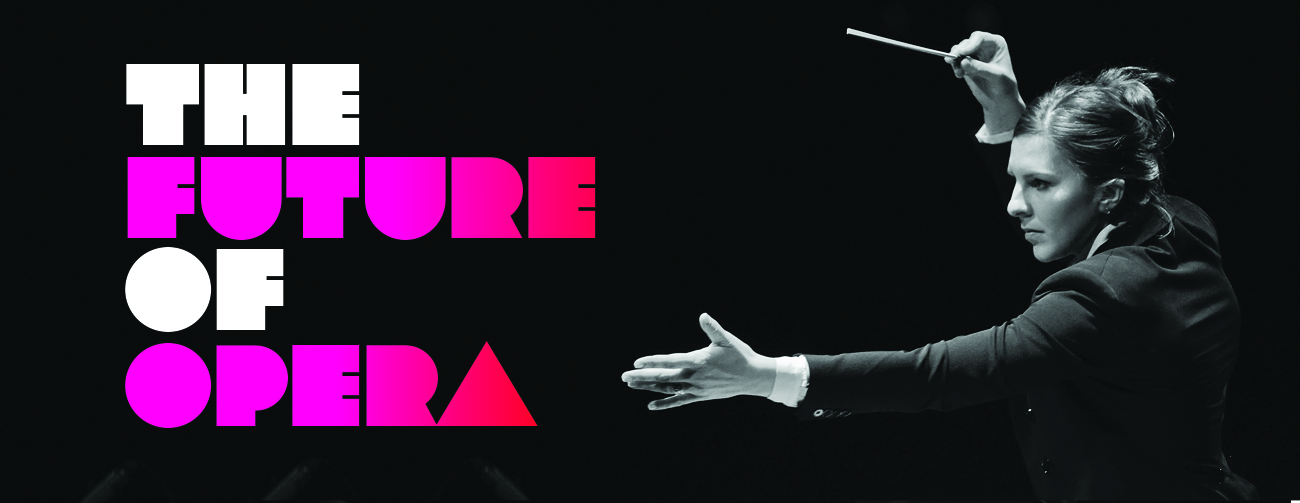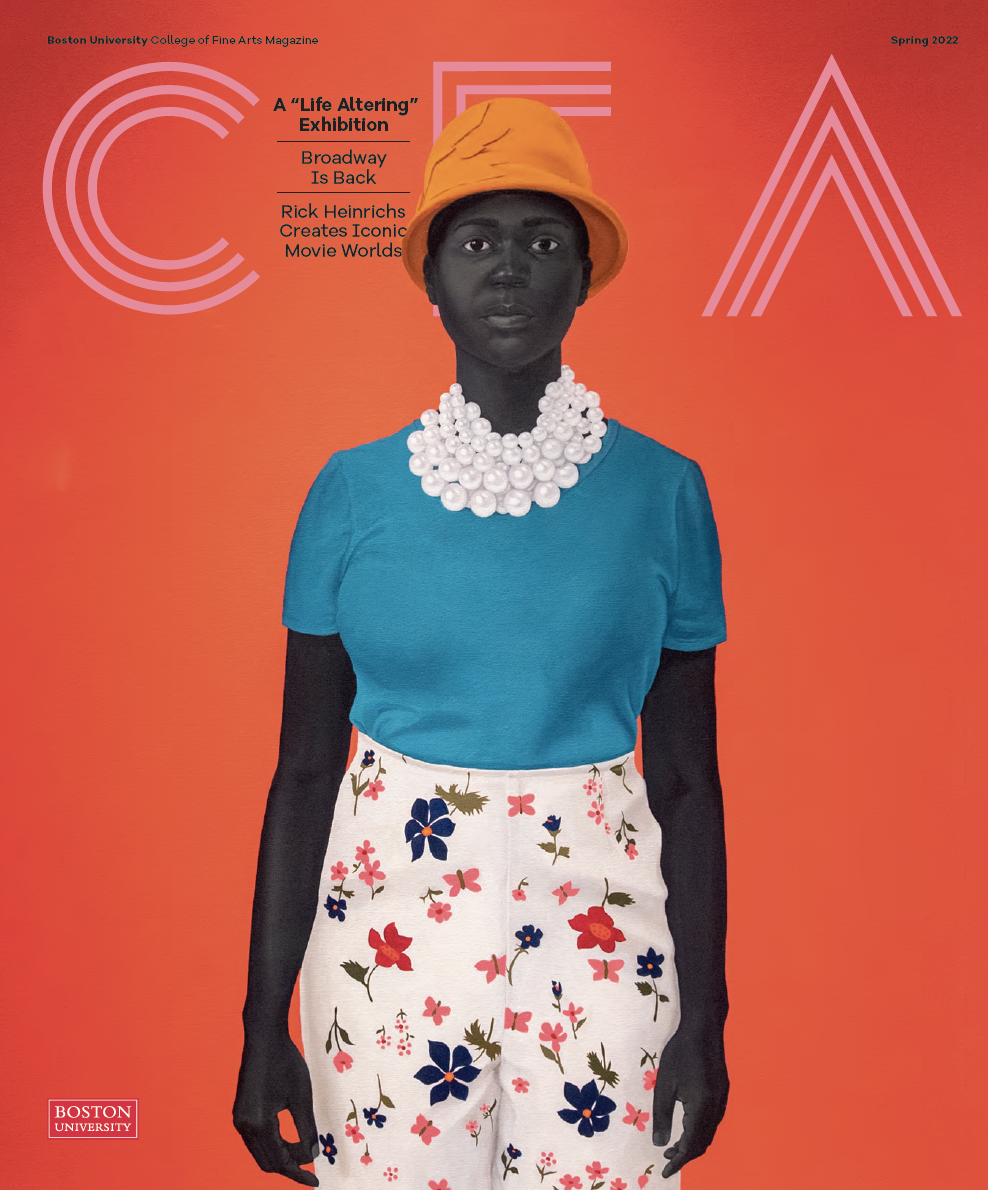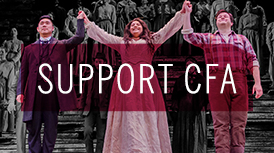The Future of Opera
Chicago Opera Theater Music Director Lidiya Yankovskaya is one of America’s few women conductors and a force for change
By Andrew Thurston | Photo by Karen Almond
If you watch any US orchestra, particularly one with a multimillion-dollar budget, you’re almost guaranteed to see a white man standing on the conductor’s podium. Most estimates put the share of women conductors in America at or below 10 percent—and that’s only if you include those holding the baton for community groups, youth orchestras, and summer festivals.
At Chicago Opera Theater, Lidiya Yankovskaya is among the few to crack an especially thick glass ceiling. She’s one of only a handful of women conducting at a leading US orchestra—and one of just two at a major opera company.
“There’s a larger percentage of women who are studying conducting at universities, conducting with smaller organizations, or doing really fantastic work out there,” says Yankovskaya (’10), who sets the tempo and cues in the musicians as Chicago Opera Theater’s Orli & Bill Staley Music Director. “Not enough of them have gotten opportunities to move to the next level and work with larger-budget institutions. But I think it’s changing and will probably continue to change.”
In part, that change is a result of Yankovskaya’s efforts. She chooses work that lifts young composers and helps mentor women looking to follow in her path.
“Her presence behind the podium is breaking down barriers that have long existed for women in the industry.”
“Her presence behind the podium is breaking down barriers that have long existed for women in the industry,” says Ishan Johnson, associate director of development at Chicago Opera Theater. A voice performance major at CFA, Johnson (’06) has known Yankovskaya since 2008, when the two worked on an Opera Boston performance of Dmitri Shostakovich’s The Nose. “There is a lack of minority and women leadership in opera administration, and Lidiya seeks to change that.”
A Nontraditional Trajectory
Born in perestroika-era St. Petersburg, Yankovskaya spent her early childhood in a crumbling Soviet Union, then in a Russia struggling to find its identity. As the country staggered through coups and constitutional crises, waves of Jewish families left, including Yankovskaya’s. In 1995, they fled their home in Russia and became refugees.
“I remember passing by a major square in the middle of the city where fascists would fly large swastika flags and hand out pamphlets that said ‘Kill all the Jews’ on them,” she told Newsweek in 2016. “Russia, in general, at the time was in economic and political turmoil, so there was a lot of hardship overall. When that happens, people tend to blame any larger minorities that exist.”
Many Russian Jews emigrated to Israel, but the Yankovskayas came to upstate New York. Despite the upheaval for young Lidiya—just nine when her family moved across the world—there remained one constant: music.
As a child, Yankovskaya studied piano and voice, adding violin when she moved to the United States. Music was more than a hobby. “It was always something I lived for and that was a top priority for me. I even remember as a kid saying I’d rather just stay home and practice than go do the social thing.”
During high school and college—she studied music and philosophy at Vassar College—Yankovskaya kept practicing and playing, but wasn’t sure what a life in music would look like.
“You see these traditional musical trajectories of where your career would be,” she says. “For me, it seemed that solo piano would be the thing I would have to do, and I did not want to sit alone in a practice room for that many hours and be traveling alone. That just wasn’t right for me.”
Her undergraduate experience included conducting—and she’d even had a few turns with the baton as a teenager. But it was “not something I realized you could make a career out of,” says Yankovskaya.
At CFA, her thinking began to change. For two years, Yankovskaya studied musicology, music theory, and conducting techniques, learning the technical skills necessary to hold an orchestra together. She also began to work as a conductor, standing out front for Opera Boston, Boston Opera Collaborative, and Lowell House Opera. After graduation, she was appointed artistic director and conductor for the Juventas New Music Ensemble, a group dedicated to performing the work of young, contemporary composers, and later added the Commonwealth Lyric Theater to her résumé. Soon, she was being hailed as a rising star.
“If there were a futures market for classical music, the touts would be pushing Lidiya Yankovskaya,” wrote Keith Powers for WBUR in March 2017. “She’s busy. She’s busy because she’s good.”
Three months after that glowing review, Yankovskaya was named music director at Chicago Opera Theater.
“She is as skilled with operas of the past as she is with works of living composers,” said the president of Chicago Opera Theater’s board of directors, Susan J. Irion, of the appointment. “Lidiya is sure to be a charismatic ambassador of opera in today’s world.”
New Audiences
There’s a common conductor stereotype: tyrannical, wild-eyed, eccentric. It’s generally unfair—and it’s definitely not Yankovskaya. She describes conducting as a collaborative process, working with individual musicians to help them become part of a whole. Sometimes, that simply requires her to provide a channel for them to connect with each other; other times, she has to firmly guide them. She says each group of musicians and each piece of music bring their own dynamic—it’s as much an exercise in psychology as understanding and interpreting a score.
“One type of artistic work may require something very rigid and precise, while another needs complete freedom,” she says. “One of the things I strive for is figuring out for each piece of art, what does this piece need from me in this moment, what do I need to do to create the greatest impact?”
There’s also plenty that happens offstage and outside of rehearsals. Yankovskaya is a leader and figurehead for Chicago Opera Theater, working with donors and shaping the organization’s direction through its choice of shows. Given her history, Yankovskaya is especially interested in Russian masterpieces, but she’s also an advocate for contemporary opera. Under her leadership, the theater has given Chicago premieres to work as diverse as Jake Heggie’s 2010 opera, Moby-Dick, and Tchaikovsky’s 1892 lyric opera, Iolanta.
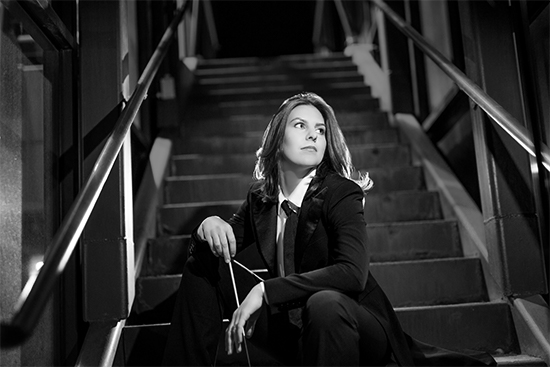
As music director of the Chicago Opera Theater, Lidiya Yankovskaya (’10) makes it a point to choose work that lifts young composers and helps mentor women looking to follow in her path. Photo by Kate Lemmon
“One of the things we focus on is bringing work to the stage that speaks to our audiences today and that is about issues or questions that may arise for our audience.”
“One of the things we focus on is bringing work to the stage that speaks to our audiences today and that is about issues or questions that may arise for our audience,” says Yankovskaya. “Even if it’s for traditional work, making sure that we connect it to our audiences and their experience.”
One part of that is helping the theater reach new audiences. In February 2020, the theater premiered Dan Shore’s Freedom Ride, about the civil rights activists who rode buses to protest segregation. The show was produced in partnership with the Chicago Sinfonietta, which aims to improve diversity in—and increase access to—classical music.
“She’s made a commitment helping to make opera accessible to different communities,” says Johnson, “exploring repertoire that adds to the canon, and finding innovative ways to bring opera to a greater audience.”
Yankovskaya also started Chicago Opera Theater’s Vanguard Initiative, a mentorship and development residency program for emerging opera composers. And, as music director, she’s involved in the theater’s broader educational efforts, including one in Chicago Public Schools that gives children the chance to write their own operas.
Just before she spoke with CFA, Yankovskaya was on a call in support of the Taki Concordia Conducting Fellowship, which mentors young women hoping to make it at the highest level. In 2015, she was one of those who benefited from its backing.
“One of the most important things in order for any industry—for our world—to have progress and change moving forward is to attract the brightest young talents,” says Yankovskaya. “It’s also important to make sure that we fight the inequities that exist that prevent new ideas from entering our work.”
A Refugee Orchestra
As a refugee, Yankovskaya is also focused on tackling the inequities that impact people forced to flee their home countries.
In 2016, she founded the Refugee Orchestra Project to help raise awareness of the role émigrés play in American society. The orchestra, which has played concerts across the northeastern United States and in the United Kingdom, brings together musicians who found shelter in the US after escaping persecution, as well as their families and friends. Yankovskaya says the nonprofit proved especially vital during the COVID-19 lockdowns. Because so many refugees lack family networks or other support systems, they’re especially vulnerable to health or economic insecurities.
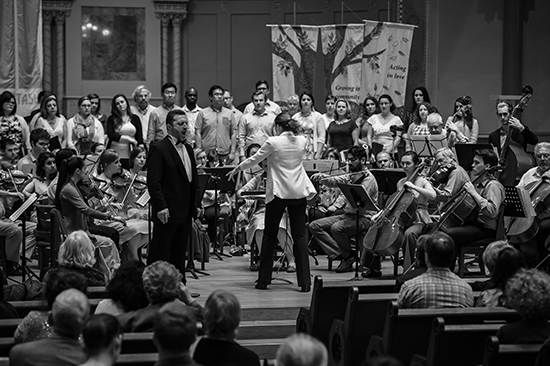
Yankovskaya founded the Refugee Orchestra Project in 2016 to raise awareness of the role émigrés play in American society. Photo by Scott Bump
“We commissioned composers to write solo work for some of our performers that they can play on their own, record on their own,” she says. “It was an opportunity for the creation of new work and to showcase the artists and composers we work with—and to give them some employment and some opportunity to create.”
With theaters shuttered for much of 2020, Yankovskaya has experimented with other virtual projects, too, including digital performances and online conversations about the inner workings of an opera theater. While that may have encouraged an exploration of different ways of reaching new audiences or sharing music, she says the year has mostly been a chance to reflect on what she loves the most.
“To me, live performance is irreplaceable,” she says. “I so miss being in a room with people making music. I do not think there’s a substitute for that.”
Also in This Issue: How CFA professor Michael Reynolds supports youth music education programs.

